| Author |
Message |
Sean Flynt

|
 Posted: Fri 07 Aug, 2009 9:53 am Post subject: New Windlass Type XVIII Project (Erbach Sword) Posted: Fri 07 Aug, 2009 9:53 am Post subject: New Windlass Type XVIII Project (Erbach Sword) |
 |
|
Only a little over 24 hours after spotting this in MRL's "Deal of the Day" bin for $132, I'm sitting here looking at the two I ordered. No special shipping--the speed is due to my proximity to Atlanta. Here are some photos and preliminary observations:
I'm very impressed by this sword. In a perfect world the blade might be slightly thicker, but this is a very broad cutting sword, so the flex doesn't seem unreasonable. The sword is 3lbs 2oz but the POB is 3.5" below the cross. It's very lively. I'd probably prefer a flat grind as opposed to a hollow grind, as that would shift the POB down a bit, give the weapon a stronger blade presence. Those who'd rather have power over speed could turn this into a single-hand sword like the one shown in one of the paintings below. The resulting POB would let you feel the blade more.
On another recent thread here we were discussing the development of the Continental European execution sword and I noted that in the decapitation images I see in German/Austrian artwork of 1450-1530, the weapon of choice is just a broad-blade longsword or bastard sword. Handling this reminds me why a Type XVIII would be such an efficient means of execution. Scary--especially with the very slight hollow-grinding of this blade.
This blade is Windlass blunt, which is to say that it gives the impression that while it won't cut your hand if you run it down the edge, it could still easily kill or maim when swung with intent.
I bought two of these swords. This gives me the interesting opportunity to examine Windlass swords side-by-side. What I find is not identical swords but swords enough alike that if I saw them apart from each other I'd never know which was which, with one minor exception (see next para). The only noticeable difference when the swords are together is that one is longer by maybe .5". You can see the difference in the photo below.
In spite of the "Guaranteed For Quality" tags on the hilts, I found a strange flaw in the tip of one of the swords. What I first thought was a slight bend at the tip turned out to be a small bit that hadn't been ground properly. Easily fixed in a few minutes of filing.
Grip and Scabbard: Blah. Wondering if I could remove the grip wrap without any tools, I found that I could easily pull out the coarse stitching with my fingers and peel the leather off, baring the grip in under 30 secs! The grip core is much better than on, say, the German Bastard Sword I got a few years ago. That was just a dowel with some flats ground in. If this one fits the tang well it could easily be refined in-place and re-covered if you're not inclined to strip the weapon.
I might be able to modify one of the scabbards for use with my A&A Town Guard sword (all-leather construction is appropriate for that period) but the things might be too bulky even for that application.
Pommel: Much better than shown in other photographs I've seen (MRL, KOA). The fluting extends almost to the base of the pommel, as it should, so there isn't that "dead zone" at the base of the pommel that I thought would present a problem. I'd say the base is still just a bit too broad for my taste and for the new grip I'll be making. That will require some time with the file or Dremel. The peen is large and filed to blend with the lines of the pommel fluting. I'd clean it up and otherwise leave it as it is but I really need to get that cross off, so I'll take the usual route of breaking off the grip, sliding down the pommel to expose the peen, and filing/grinding/cutting down the peen so I can remove the cross and prepare for an appropriate peen block.
In short, it's an outstanding bargain for a good sword that is about to become much better. If you got one of these yesterday, pat yourself on the back, especially if it's your first sword.
 Attachment: 111.46 KB Attachment: 111.46 KB
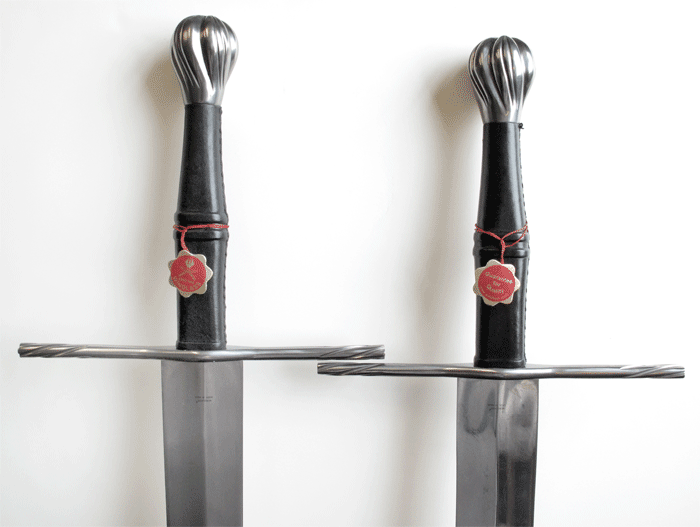
 Attachment: 98.64 KB Attachment: 98.64 KB
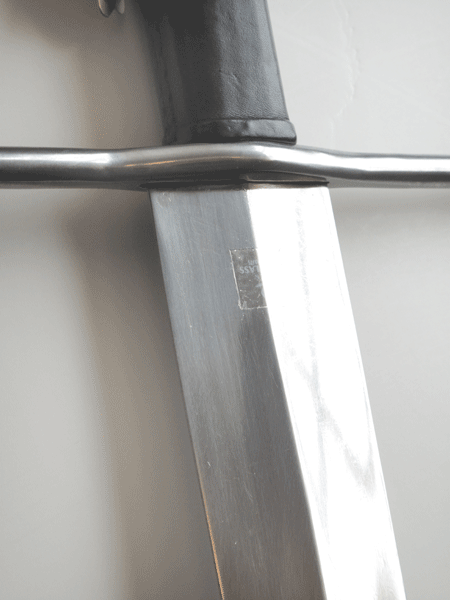
 Attachment: 153.2 KB Attachment: 153.2 KB
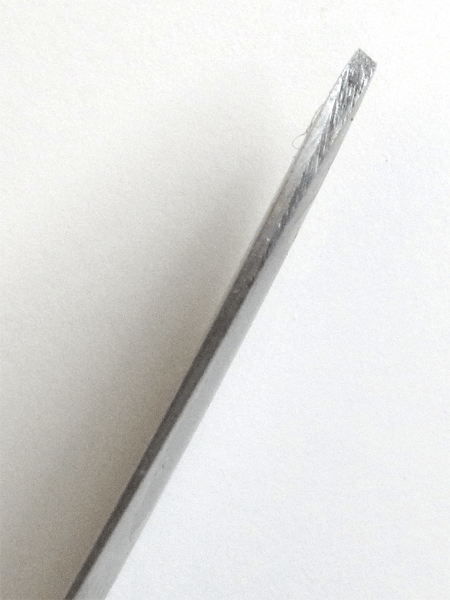
 Attachment: 191.82 KB Attachment: 191.82 KB
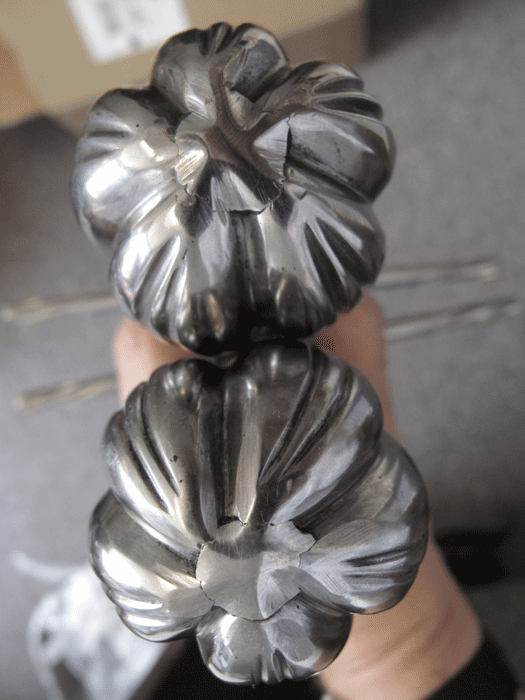
-Sean
Author of the Little Hammer novel
https://www.amazon.com/Little-Hammer-Sean-Flynt/dp/B08XN7HZ82/ref=sr_1_1?dchild=1&keywords=little+hammer+book&qid=1627482034&sr=8-1
Last edited by Sean Flynt on Mon 17 Aug, 2009 10:44 am; edited 6 times in total
|
|
   |
 |
Sean Flynt

|
|
   |
 |
Sean Flynt

|
 Posted: Fri 07 Aug, 2009 10:58 am Post subject: Posted: Fri 07 Aug, 2009 10:58 am Post subject: |
 |
|
Here's something else interesting, from the Higgins Armory Museum:
* Accession Number: 940
* Region: Southern Germany or Switzerland
* Artifact Type: Pommel of a sword
* Date: about 1570
* Materials: Iron
* Weight: 10 oz.
Iron. Large & heavy fig-shaped, narrow end towards grip. Deeply carved & filed in spiralled treatment of 6 rounded ribs alternately cross-hatched & roped, the patterns formed by thin engraved lines. No base nor button. Axially pierced for strong rectangular tang tapering acutely.
 Attachment: 42.33 KB Attachment: 42.33 KB
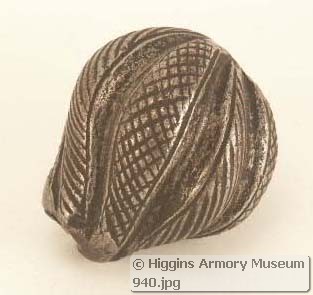
-Sean
Author of the Little Hammer novel
https://www.amazon.com/Little-Hammer-Sean-Flynt/dp/B08XN7HZ82/ref=sr_1_1?dchild=1&keywords=little+hammer+book&qid=1627482034&sr=8-1
|
|
   |
 |
Scott S.

|
 Posted: Fri 07 Aug, 2009 11:26 am Post subject: Posted: Fri 07 Aug, 2009 11:26 am Post subject: |
 |
|
Aww,
Those do look nice. I did pass on that deal, and still hadn't heard from KOA regarding their price-matching policy,
but I decided to concentrate on upgrading what I have, save a few bucks and most appropriately, I think a donation here is in order.
Can't wait to see what you do with them!
|
|
  |
 |
|
Neil Schiff
Location: Las Vegas, NV Joined: 03 Jun 2009
Posts: 70
|
 Posted: Fri 07 Aug, 2009 12:25 pm Post subject: Posted: Fri 07 Aug, 2009 12:25 pm Post subject: |
 |
|
|
I've had my eye on this one for a while, so was very excited and ordered one (albeit after some heavy deliberation due to the fact that I just ordered one of the prototypes). It's good to hear that they're at least as good as I'd hoped. I'll have to wait almost a week for mine, though (Las Vegas is NOT very close to Atlanta :-p).
|
|
  |
 |
Thom R.

|
 Posted: Fri 07 Aug, 2009 1:17 pm Post subject: Posted: Fri 07 Aug, 2009 1:17 pm Post subject: |
 |
|
|
I have been waiting as well............ and bought two yesterday, one blunt and one sharp. I think I will be putting a different cross and pommel on the sharp. I'll decide when I get them here where exactly I am going to go with them. I think these will make for nice project blades especially at the price point yesterday. tr
|
|
  |
 |
Sean Flynt

|
 Posted: Fri 07 Aug, 2009 7:00 pm Post subject: Posted: Fri 07 Aug, 2009 7:00 pm Post subject: |
 |
|
| Thom R. wrote: | | I have been waiting as well............ and bought two yesterday, one blunt and one sharp. I think I will be putting a different cross and pommel on the sharp. I'll decide when I get them here where exactly I am going to go with them. I think these will make for nice project blades especially at the price point yesterday. tr |
FWIW, I see lots of these fig-shaped pommels paired with horizontally recurved crosses. I've thought about taking that approach, though I'd probably have to fabricate that myself from square stock. That's a heap of work without a grinder or belt sander. I think the current cross has a lot going for it. It's not as overbuilt as some Windlass crosses. It's too long, but that's a simple fix. I'm wondering if I could successfully trumpet the ends by heating them to red and hammering them.
-Sean
Author of the Little Hammer novel
https://www.amazon.com/Little-Hammer-Sean-Flynt/dp/B08XN7HZ82/ref=sr_1_1?dchild=1&keywords=little+hammer+book&qid=1627482034&sr=8-1
|
|
   |
 |
Sean Flynt

|
 Posted: Mon 10 Aug, 2009 10:27 am Post subject: Posted: Mon 10 Aug, 2009 10:27 am Post subject: |
 |
|
I've stripped these swords to make storage a bit easier, so I can report on construction. Grip material, quality and assembly are identical to that of the Windlass Type XIV also on my bench. Drove a chisel along one edge of the grip, top to bottom, then put the grip in a vise and used the crosses to turn the sword, breaking off the grip. Small spot of dark expoxy inside and (barely) securing cross and pommel. These parts came free with very light taps with a rubber mallet. When the pommel slid down, I could see that the peen is very thin. In fact, the fastest way to remove the peen was to rest it on an anvil and just pound down that spread steel until it broke off. Followed with a bit of filing until the pommel and cross could clear the tang. Nice blade. Light, but still....
The first of these projects will be a straight upgrade--grip, stabilization, peen block, permanent assembly, bluing and scabbard. That's the one I'll sell.
The other project might be a bit more ambitious. I really like the early 16th c. south German swords like the ones shown below. They're so unusual but beautifully proportioned. The Dresden sword is 46" and 4lb. The Windlass sword is 43.25" and 3lb. Do you suppose a slightly scaled-down version is historically plausible?
I happen to have a Windlass "Saxon" hilt left from my last German sword project, and could modify that to create a recurved cross. I'd have to take couple of inches of blade to make that long grip. The scabbard would be great fun! My only hesitation is the writhen pommel. I haven't seen that on these funky bastard swords.
Just for fun, working quickly and only from memory, I "sketched" a possible design in clay. I'd make many changes for a serious model (trying to match the proportions of these historical examples). Still, it's an interesting idea.
 Attachment: 65.37 KB Attachment: 65.37 KB
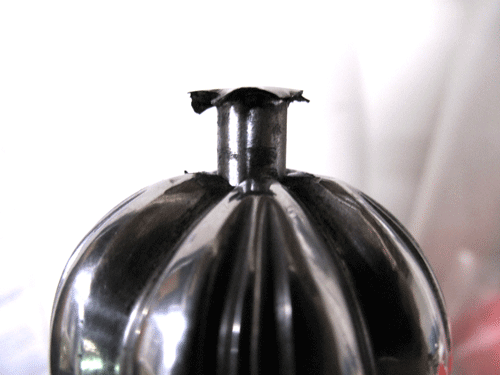
 Attachment: 213.21 KB Attachment: 213.21 KB
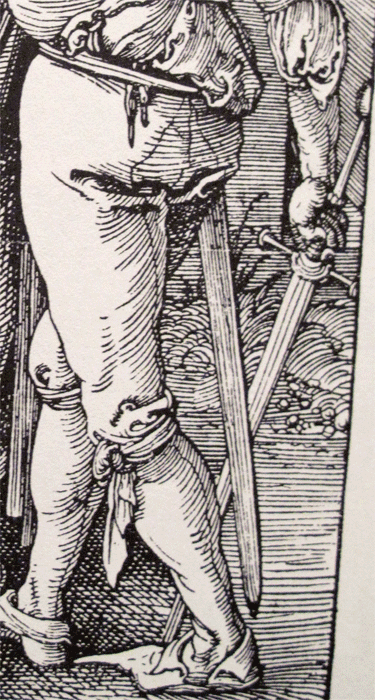
 Attachment: 118.56 KB Attachment: 118.56 KB

 Attachment: 194.5 KB Attachment: 194.5 KB
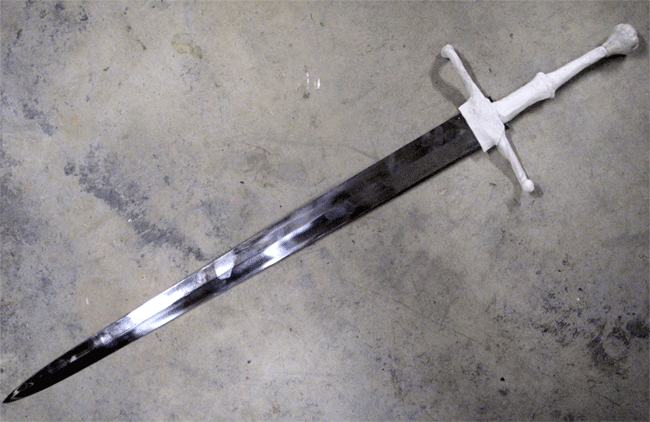
-Sean
Author of the Little Hammer novel
https://www.amazon.com/Little-Hammer-Sean-Flynt/dp/B08XN7HZ82/ref=sr_1_1?dchild=1&keywords=little+hammer+book&qid=1627482034&sr=8-1
Last edited by Sean Flynt on Mon 17 Aug, 2009 10:46 am; edited 1 time in total
|
|
   |
 |
Julien M

|
 Posted: Tue 11 Aug, 2009 1:39 am Post subject: Posted: Tue 11 Aug, 2009 1:39 am Post subject: |
 |
|
That's a very striking design Sean, very promising too.
I love this sword as well as I am often driven towards wide blades. I would have thought the erbach blade would be too thin to fit such a hilt but it is the other way around....I amost like the overall design of yours over the orginal. What is that putty you use for design purposes? I can see now that this method surpases most flat sketches.
J
edit: as far as the pommel is concerned you can surely rework it and get rid of the writhen pattern?
|
|
  |
 |
Sean Flynt

|
 Posted: Tue 11 Aug, 2009 5:52 am Post subject: Posted: Tue 11 Aug, 2009 5:52 am Post subject: |
 |
|
| Julien M wrote: | That's a very striking design Sean, very promising too.
I love this sword as well as I am often driven towards wide blades. I would have thought the erbach blade would be too thin to fit such a hilt but it is the other way around....I amost like the overall design of yours over the orginal. What is that putty you use for design purposes? I can see now that this method surpases most flat sketches.
J
edit: as far as the pommel is concerned you can surely rework it and get rid of the writhen pattern? |
Thanks! The fluting of the pommel is so deep that I wouldn't be able to grind it to a doorknob shape--there wouldn't be much left. I've looked at cast iron doorknobs, without much luck. This project will have to be merely "inspired by" anyway because I can't match the length and weight of that Dresden sword. Looking more at the art of the period I see this pommel matched with a great variety of blades and crosses, so if I go this route I think I would just narrow the base and file the cross terminals into writhen form. Maybe the arms of the cross, too. I'm definitely going to cultivate arthritis on this one but one must keep striving.
The white stuff is Sculpey polymer clay. Great stuff. It's rigid enough to hold its shape but soft enough to work easily. It doesn't dry out and a box of it will last forever if you use it like I do. I just sketch with it, slapping it on, mashing it into rough shape and then refining a bit with a craft knife. This is mainly just to see an idea in the flesh before I invest any time in it. If I think it's OK then I just mash up the clay--workshop filth and all--and put it back in the box.
If you want permanent and highly detailed models (paperweight-size sallets and such) you just make a semi-finished model, bake it in a conventional oven for 15 minutes or so, then let it cool. Then you can carve and sand it like a soft wood to add details and finish. Takes paint well. It's pretty easy to find in craft stores or online. Your best bet will be here:
Hamleys
regent street
Westminster
London
Tiranti's
Warren Street
London

-Sean
Author of the Little Hammer novel
https://www.amazon.com/Little-Hammer-Sean-Flynt/dp/B08XN7HZ82/ref=sr_1_1?dchild=1&keywords=little+hammer+book&qid=1627482034&sr=8-1
|
|
   |
 |
Sean Flynt

|
 Posted: Tue 11 Aug, 2009 11:21 am Post subject: Posted: Tue 11 Aug, 2009 11:21 am Post subject: |
 |
|
Lengthening the grip by shortening the blade (in Photoshop) improves the proportions of the original cross. I think this looks fine now, which means I don't need a new cross for this project, which means I can do this to both swords, providing something more unique, less Erbach-ish. I planned to blue both hilts, but this looks pretty nice bright. The hilt to blade proportion is 3 to 1.
What do y'all prefer--something more traditional (closer to the original Erbach sword) or this less common configuration? Bright (satin) or blued?
 Attachment: 50.12 KB Attachment: 50.12 KB

-Sean
Author of the Little Hammer novel
https://www.amazon.com/Little-Hammer-Sean-Flynt/dp/B08XN7HZ82/ref=sr_1_1?dchild=1&keywords=little+hammer+book&qid=1627482034&sr=8-1
|
|
   |
 |
Luka Borscak

|
 Posted: Tue 11 Aug, 2009 4:13 pm Post subject: Posted: Tue 11 Aug, 2009 4:13 pm Post subject: |
 |
|
|
If I were you, I wouldn't blue the hilt in combination with black leather. But bluing would look great with red or oxblood grip. Probably with anything but the black. Unless it would be very light bluing, more like just a bit of antiquing. And the new, less "Erbachish" look is more interesting to me.
|
|
  |
 |
|
Hadrian Coffin
Industry Professional
Location: Oxford, England Joined: 03 Apr 2008
Posts: 404
|
 Posted: Tue 11 Aug, 2009 5:14 pm Post subject: Posted: Tue 11 Aug, 2009 5:14 pm Post subject: |
 |
|
Personally I prefer the more traditional erbachish look but that's just me. I find dark brown goes wonderfully with blued fittings. Though I think black looks good as well.
Just my opinion,
Regards,
Hadrian
Historia magistra vitae est
|
|
   |
 |
Michael Edelson

|
 Posted: Tue 11 Aug, 2009 6:04 pm Post subject: Posted: Tue 11 Aug, 2009 6:04 pm Post subject: |
 |
|
Sean,
I'm in love with your clay prototype...would you consider making me one like that from the blade you plan to sell?
New York Historical Fencing Association
www.newyorklongsword.com
Byakkokan Dojo
http://newyorkbattodo.com/
|
|
   |
 |
Sean Flynt

|
|
   |
 |
Sean Flynt

|
 Posted: Fri 14 Aug, 2009 7:14 am Post subject: Posted: Fri 14 Aug, 2009 7:14 am Post subject: |
 |
|
Looks like the recurved cross with finials is off the table. I was already having second thoughts about weight distribution in my design when somebody asked to buy the "Saxon Hilt" that was going to supply that cross. The weight problem is due mainly to the relatively light weight of the blade. If it were a bit heavier I could cut the blade down to ~33 inches and retain good blade presence. After some experiments I think that doing that with this blade (and that robust cross) would pull the POB a little too close to the cross. Hard to say for sure because my design would require significant reduction of pommel weight. I'm still going to consider the short blade/long grip design, though. The lighter original cross or an entirely new cross and a reduced pommel could work out.
-Sean
Author of the Little Hammer novel
https://www.amazon.com/Little-Hammer-Sean-Flynt/dp/B08XN7HZ82/ref=sr_1_1?dchild=1&keywords=little+hammer+book&qid=1627482034&sr=8-1
|
|
   |
 |
Sean Flynt

|
 Posted: Wed 19 Aug, 2009 11:49 am Post subject: Posted: Wed 19 Aug, 2009 11:49 am Post subject: |
 |
|
I still really don't want to copy the original Erbach sword (much less the A&A interpretation,) but this thing just wants be that sword, in terms of proportions and hilt details. I've come up with a couple of historically accurate ways to avoid slavish (and pointless) copying, but right now it looks like these swords are going to be more Erbach-ish than I'd planned. I think they'll be very attractive--blued, maybe with rain guard, maybe with filed quillon block (maybe one of each!). Scabbards and belts, too.
I'll still need to tweak the hilt proportions. One thing I've noticed is that on many such historical swords the length of one cross arm is equal to the distance between the base of the grip and the center of the grip's central swelling. Seems like a good rule of thumb. It looks better, but it also handles better--the current length of the cross makes some motions difficult (cross hits foream of the weapon hand).
-Sean
Author of the Little Hammer novel
https://www.amazon.com/Little-Hammer-Sean-Flynt/dp/B08XN7HZ82/ref=sr_1_1?dchild=1&keywords=little+hammer+book&qid=1627482034&sr=8-1
|
|
   |
 |
Sean Flynt

|
|
   |
 |
|
Luke Zechman
Location: Lock Haven Pennsylvania Joined: 18 Jan 2009
Posts: 278
|
 Posted: Wed 23 Sep, 2009 7:07 pm Post subject: Posted: Wed 23 Sep, 2009 7:07 pm Post subject: |
 |
|
|
Looks good Sean. The finish looks very consistent and well done. How did you achieve that finish if you don't mind me asking. It almost looks bead blasted. Also just wanted to say it is good to see this thread pop again... makes me get the itch to get back to my gladii project. If only school wasn't kicking my arse right now! I look forward to more!
|
|
  |
 |
Sean Flynt

|
 Posted: Thu 24 Sep, 2009 5:39 am Post subject: Posted: Thu 24 Sep, 2009 5:39 am Post subject: |
 |
|
| Luke Zechman wrote: | | Looks good Sean. The finish looks very consistent and well done. How did you achieve that finish if you don't mind me asking. It almost looks bead blasted. Also just wanted to say it is good to see this thread pop again... makes me get the itch to get back to my gladii project. If only school wasn't kicking my arse right now! I look forward to more! |
I used a Dremel tool and cutoff wheel to extend the fluting down toward the base, so I had to follow up with a relatively coarse sanding drum and paper creased so it would fit in the flutes. Same piece of sandpaper wrapped around a sanding sponge for the all-over. I don't remember if I followed all this with a steel wire brush bit in a drill, but I think I did. It has that look about it--lightly textured but polished. The final finish will a bit more refined but close to this satin look. FYI--In my experience blued steel tends to look more highly polished than the same piece with satin finish.
-Sean
Author of the Little Hammer novel
https://www.amazon.com/Little-Hammer-Sean-Flynt/dp/B08XN7HZ82/ref=sr_1_1?dchild=1&keywords=little+hammer+book&qid=1627482034&sr=8-1
|
|
   |
 |
|
|

